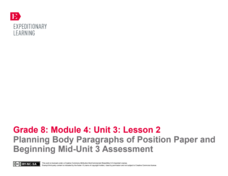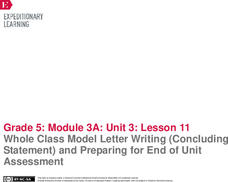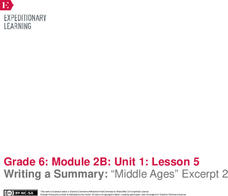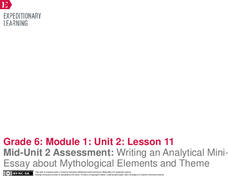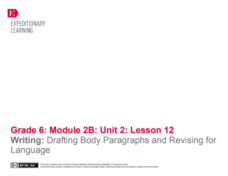Curated OER
Grade 5 Develop a Paragraph
In this paragraph learning exercise, students cut out the 5 sentence strips that will form the opening paragraph of a speech on cooking. Students arrange the sentences in order: topic sentence, details and concluding sentence.
EngageNY
Planning Body Paragraphs of Position Paper and Beginning Mid-Unit 3 Assessment
The best sandwiches aren't always edible. Pupils use a Quote Sandwich graphic organizer to plan paragraphs two and three of their position papers about the best food chain. Next, they begin drafting their body paragraphs for the mid-unit...
Curriculum Corner
Informational Text Graphic Organizers
Examine informational text with a three-page worksheet that focuses on taking notes, identifying the main idea, and locating supporting details in order to form a summary paragraph.
K20 LEARN
Who Am I? Creating And Editing Descriptive Writing
With descriptive writing, the pleasure is in the details. Young writers learn how to add sensory details to a paragraph about themselves. They read a short paragraph and identify the sensory details used. After revising their draft...
Calloway County Schools
Dialogue Rules, Worksheet, and Writing Assignment
Punctuating dialogue properly can be tricky, but your pupils can become punctuation masters with practice. This resource includes an explanatory page that describes the rules of writing dialogue and provides examples. On the second page,...
K20 LEARN
Writing An Argumentative Paragraph: Argumentative Writing
Learning how to craft a cogent argument based on a solid claim, supported with evidence and solid reasoning, is an important life skill. Teach middle schoolers about argumentative writing with a lesson asking them to analyze the claims,...
K20 LEARN
Writing Is Elementary, My Dear Watson: Writing Paragraphs With Evidence And Reasoning
Did Smitty do it, or is he a victim? Sleuths apply their observation and reasoning skills to build a case for an argumentative paragraph. Class members closely observe a cartoon, make a claim, cite evidence from the image, and support...
Curated OER
Mr. Indent: A Write On Activity
Using a cute premise, a bodybuilder named Mr. Indent, this resource explores the correct use of indentation. As a review of this concept, this presentation would be a great tool to use in the classroom. There are examples and exercises...
Museum of Tolerance
Cultural Research Activity
Class members explore cultural diversity through a variety of texts that showcase the importance of traditions. Then, they interview their family members to research their own cultural background and write their findings on quilt pieces....
Curated OER
Narrative Writing
Are you the oldest in your family? The youngest? The middlest? How do you feel about your place in your family? After reading such stories as My Rotten, Redheaded Older Brother by Patricia Polacco and Tales of a Fourth Grade Nothing by...
Reproducible Master
Reader’s Journal
As you read a story or novel, have your class members put together and fill out a journal. They will have the chance to illustrate a cover page, draw and write about various topics, respond to a focus questions, and draft a paragraph.
EngageNY
Planning for Writing: Introduction and Conclusion of a Literary Argument Essay
After completing three body paragraphs of an argument essay about life's rules to live by from Bud, Not Buddy Christopher Paul Curtis, it's time to begin writing the introduction and conclusion. Independently, pupils draft the final two...
EngageNY
End of Unit 2 Assessment, Part 1b: Writing Introduction and Conclusion
Writers continue looking at the rubric for their A Long Walk to Water essays. This time, they analyze the demands for the introduction and conclusion paragraphs. Pupils compare the rubric to the opening and closing of the model essay,...
EngageNY
Organizing Evidence and Writing an Opinion Paragraph: The Importance of Sports in American Society, Part II
Batter up! Using the resource, pupils continue reading an informational article about sports in America and identify evidence that supports the author's opinion. Scholars then write an opinion paragraph about sports.
EngageNY
Whole Class Model Letter Writing (Concluding Statement) and Preparing for End of Unit Assessment
Pupils work in small groups to collaboratively write a concluding paragraph for their opinion letters about Jackie Robinson's legacy. Then, scholars share their opinion, reasons, and evidence with a classmate.
EngageNY
The Painted Essay: The Introductory Paragraph
Mimic the model for the perfect essay. Scholars work in groups to analyze a model painted essay The Electric Motor. They compare the structure of the model essay to the painted essay template they created in the previous activity. The...
Curated OER
Writing Organizers
Eight graphic organizers to choose from? That's right! Each of these organizers relates to writing or reading. From narrowing a writing topic, to responding to literature, to planning a writing project, you'll find many purposes for...
EngageNY
Revising for Organization and Style: Bold Beginnings
Get young writers thinking about how to write a great beginning for their narratives. After examining examples of solid beginnings in literary text, young writers discuss the criteria for a compelling introduction. Then, independently,...
EngageNY
Writing a Summary: “Middle Ages” Excerpt 1
What's this all about? Scholars learn the importance of summarizing skills using a summary writing graphic organizer. They work with an elbow partner to discuss summaries and complete the organizer using Middle Ages Excerpt 1. Learners...
EngageNY
Writing a Summary: “Middle Ages” Excerpt 2
What is the big idea? Scholars use Middle Ages Excerpt 2 to complete a summary graphic organizer. They then use the information from the organizer to write a summary of the text on lined paper. Learners share summaries with the class.
K20 LEARN
Introduction to Expository Writing
Move beyond the five-paragraph essay with a lesson introducing young writers to various forms of expository writing. Class members examine description, cause and effect, problem solution, sequence, and comparison forms. They create an...
EngageNY
Revising the Informative Consumer Guide: Sentence Structure, Transitions, and Works Cited
Transitions are the glue that link paragraphs together. Pupils listen to a mini lesson plan on sentence structure and transitions and use what they learned to revise their informative consumer guides. Next, they self-assess their writing...
EngageNY
Mid-Unit 2 Assessment: Writing an Analytical MiniEssay about Mythological Elements and Theme
Two is company. Scholars pair up to continue their mini essay writing from the previous lesson. They work on their introduction and conclusion paragraphs and then trade partners for peer feedback and a fresh set of eyes on their work....
EngageNY
Writing: Drafting Body Paragraphs and Revising for Language
This is a formal affair. Scholars take a look at using formal writing in essays. They analyze the model essay Are We Medieval?: Opportunities in the Middle Ages and Today? They then begin working on the first draft of their own essays.
Other popular searches
- Writing a Paragraph
- Five Paragraph Essay Writing
- 5 Paragraph Essay Writing
- Persuasive Paragraph Writing
- Example Paragraph Writing
- Hamburger Paragraph Writing
- Esl Paragraph Writing
- Narrative Paragraph Writing
- Paragraph Writing Dialogue
- Five Paragraph Writing
- English Paragraph Writing
- Sensory Paragraph Writing



